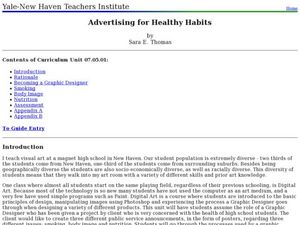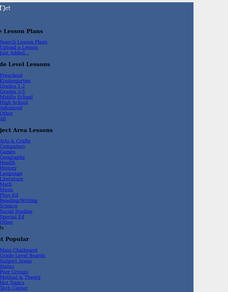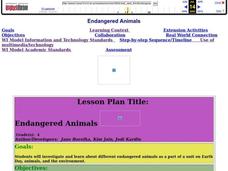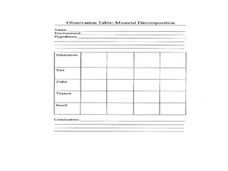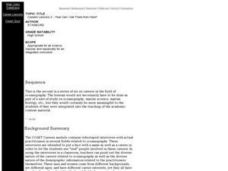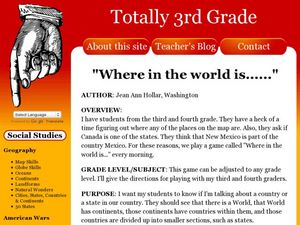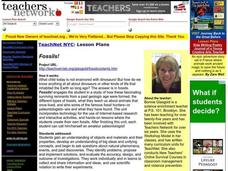Curated OER
Advertising for Healthy Habits
Students create ads based on provided topic. In this digital art instructional activity, students role play as graphic designers working on a project for a client. They research about certain health issues and prepare a public poster...
Curated OER
Cooperative Learning, Sci., Tech., Lang
Students research, write, edit, revise and present a paragraph, using word processor, about animal of their choice, including description, where animal lives, what it eats, its habits, e.g. is it endangered, migration, hibernation,...
Curated OER
Fantastic Fossil
Students discuss the discovery of a transitional animal, Tiktaalik, and its impact on the theory of evolution. They research theories of evolution and creationism.
Curated OER
Basic Vitamins: Water-Soluble and Fat-Soluble
Students examine vitamins and study their functions and food sources. They research what happens to vitamins when foods are overcooked. They prepare a microwaveable vegetable quiche.
Curated OER
Let's Heat Things Up!
Students build and evaluate simple models to understand the greenhouse effect. They explore the role of increased greenhouse gas concentration in global warming, and the implications of global warming theory for engineers, themselves...
Curated OER
Endangered Animals
Fourth graders research different endangered animals in media center as part of unit on Earth Day, animals, and environment, create project based around multiple intelligence related to an endangered animal, and produce Powerpoint...
Curated OER
Warm Air versus Cold Air
Students discover that warm air takes up more space than cold air. In this science lesson, students perform 4 experiments using balloons to determine that the molecules of warm air are more spread out than those of cold air.
Curated OER
Eureka! I’ve Got an Idea!
Learners explore many inventions and inventors. In this science lesson plan, students collaborate as they research inventors and their times in order to compile information to build an informative Web site.
Curated OER
Slow Rot or Not?
Fifth graders examine how environmental factors affect decomposition. For this decomposition lesson, 5th graders experiment with the decomposition of grapes in five different environmental settings. They look at images of items that have...
Curated OER
Buildings Have Lives, Too: Disasters and Their Effect on People
Students research natural disasters and their lasting effect on both people and the environment. In this environmental science lesson, students complete a group project on a natural disaster of their choosing. Students examine multiple...
Curated OER
Investigating Planetary Life
Students research about the search for life in Mars. For this space science lesson, students develop a creative visual display of their findings. They present their project in class.
Curated OER
Chilling Predictions
Students research and prepare an almanac on the Arctic. They examine the laws that attempt to provide jurisdiction over this area and consider how these laws be affected if geography of the Arctic continues to change due to global warming.
Curated OER
Careers Lessons 2 - How Can I Get There from Here?
Students identify differences between jobs and careers, and identify career areas within the broad field of oceanography. They research, compare and contrast requirements needed to become a practitioner of various oceanographic career...
Curated OER
Life Systems - Plant Growth
3rd graders will participate in a variety of tasks which help them to understand the basic concepts of plant growth. Research and reporting skills are developed as they gather information from various sources related to the use of plants...
Curated OER
Getting our Paws into the Cause
Twelfth graders examine local, state, and/or national animal welfare organization. In this Social Studies lesson plan, 12th graders research their identified organization. Students develop a planned intervention strategy to help...
Curated OER
Summer Camp 2050
Students create a camp for the future. In this simulation activity, students will research various energy sources, and create a proposal for the "city council" to recommend what energy sources should be used for a summer camp in the year...
Curated OER
Why Do Some Birds Have Two Homes When We Have One?
Sixth graders study migratory birds in the temperate forest and the tropical rainforest. In this migratory birds lesson, 6th graders participate in different activities that explain patterns of migration, research patterns of movement...
Curated OER
Enemies and Threats to Sea Horses
Learners research threats and enemies of the sea horse. In this animal biology lesson, students use the Internet to find threats and enemies of sea horses and write a paragraph on their findings.
Curated OER
Habitats of the World
Students discover that the Earth supports many different animal habitats. In this habitat lesson students research different habitats of the world. Students show how the animals in their habitat are adapted.
Curated OER
Physics Park
Students research and design a playground for a park or school in their community. They explore the physics concepts that are present in the design and, if applicable promote their ideas to city or school officials.
Curated OER
The Genome: Controversy for All Times
Students examine the genome and discuss the ethical and moral issues surrounding it. In groups, they discover the differences between ethics and morals and discuss where the concepts of good and bad come from in society. After reading...
Curated OER
Where in the World is...?
Young scholars work in groups to locate an appropriate planet where inhabitants of a fictional place can be relocated. They create a PowerPoint presentation to introduce their relocation site, as well as ecosystem information about the...
Curated OER
Fossils!
Young scholars conduct Internet research about different types of fossils, the animals they are from, and some famous paleontologists. They also participate in some interactive activities and hands-on lessons in which they create their...
Curated OER
Splish! Splash! Birdbath
Students explore the concept of philanthropy. In this service learning instructional activity, students research city wildlife then plan and implement a service learning project that benefits wildlife.


